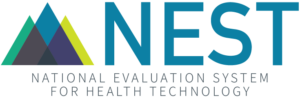Second NESTcc Data Strategy Convening Focuses on Advancing Data Network Activities
On February 27, 2019, NESTcc held its second Data Strategy Convening, followed by a NESTcc Network Collaborator meeting on February 28. The Data Strategy Convening brought together the Network Collaborators, Data Quality Subcommittee, and Methods Subcommittee to develop a shared knowledge of NESTcc’s 2019 strategy and activities, discuss implementation of the Data Quality Framework, and provide an overview of the upcoming Methods Protocol Framework and Active Surveillance Task Force activities.
The following morning, we held a meeting with the Network Collaborators to discuss NESTcc operations, focused on planning for sustainability. Here we had the opportunity to discuss the transition of NESTcc into a sustainable business structure and solicit feedback from Network Collaborators on NESTcc’s operating framework and value propositions for stakeholders.
Developing a Shared Strategy for NESTcc Frameworks
A main topic on the first day of meetings was a discussion of the Data Quality Framework. Dr. Lesley Curtis, Chair of the Data Quality Subcommittee that first met in August, outlined the five sections of the Data Quality Framework: Governance, Characteristics of Data, Data Capture and Transformation, Data Curation, and the NESTcc Data Quality Maturity Model. Together, the five sections provide a framework which will be applied by the current Network Collaborators in the NESTcc Data Network and future Network Collaborators as the Network expands. The Governance section is focused on organizational transparency and integrity and covers leadership, stewardship, and oversight of the Data Quality Framework. The Characteristics of Data section seeks to determine the types of data needed for the Framework and how this can be leveraged into actionable insights to inform clinical and regulatory decisions. Data Capture and Transformation covers the improvement of data quality at the point of care and understanding how and why data of interest were originally obtained and processed. Data Curation covers the process of addressing conformance, completeness, and plausibility of data, and seeks the establishment of an iterative process to improve data quality over time. Finally, the NESTcc Data Quality Maturity Model outlines a five-stage format to indicate progression and help identify weaknesses and opportunities.
The afternoon breakout sessions were designed to spur in-depth discussion into each of the five sections of the Framework. These breakout groups included individuals from industry, FDA, Network Collaborators, members of the Data Quality and Methods Subcommittees, and NESTcc staff. Consistent with the overall NESTcc paradigm, the multi-stakeholder perspectives delving into the nuances of the Framework sections are critical to the ability of the Framework to be updated and improved as we learn from initial activities. In addition, these perspectives ensure pragmatic implementation in a way that reflects the needs of various stakeholder groups.
It’s important for the success of NESTcc that the Data Quality Framework is not developed in isolation of other Data Network activities. Two additional key workstreams were discussed at a high level within the context of the day—the Methods Framework and the Active Surveillance Roadmap—to provide direction for these NESTcc priority areas. We are looking forward to releasing the first versions of the Data Quality and Methods Frameworks for public comment later this Spring and the revised versions later this Summer. The Active Surveillance activities will also solicit public input as they are developed.
Building the Operational Capacity of the Network
The following day, a smaller group of NESTcc Network Collaborators met with NESTcc staff for an open discussion on an array of topics, including the value of working with NESTcc, contracting and agreements, and information sharing best practices for Data Network stakeholders. The open and honest conversation between our stakeholders and staff was highly valuable, and we were thrilled with the level of engagement from our Network Collaborator partners.
As we focus on launching NESTcc Version 1.0 by the end of 2019, we rely on the feedback from and collaboration with all stakeholders to help us develop a nimble learning community and solid foundation for sustainability. Throughout the discussion, key operational topics that arose included effective communications both for day-to-day activities and broader milestones; challenges for advancing research operations and executing the required agreements to conduct retrospective, prospective, and active surveillance projects; and variation in project requirements depending on the intended regulatory purpose and the project sponsor.
These discussions were highly valuable to the NESTcc’s successful impact and relationships with stakeholders moving forward, and we look forward to continuing to provide updates on the exciting progress we are making in 2019.
In the meantime, be sure to follow us on Twitter (@NESTccMedTech) and LinkedIn, or subscribe to receive periodic email updates, including a new quarterly newsletter that will launch in April.
